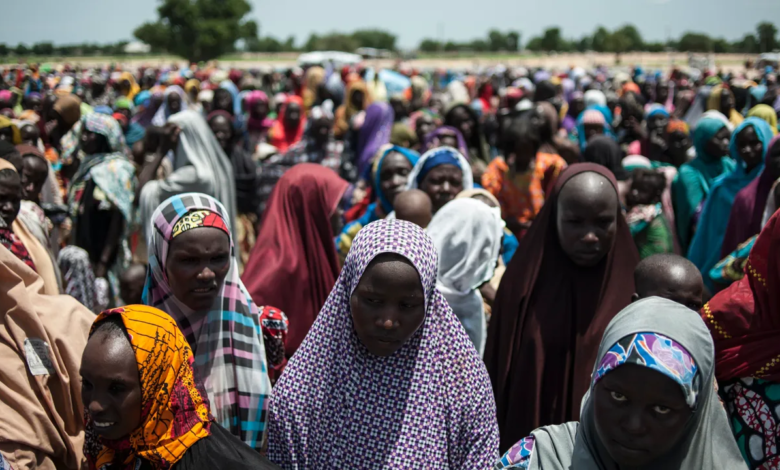Hunger In Borno’s Gubio Camp Is Worsening Disease, Pushing More Women to Survival Sex
Internally Displaced People in Maiduguri’s Gubio camp say they are still waiting to be told where they should go after the camp was officially closed. They say living conditions have collapsed following the stoppage of the distribution of food and aid to displacement camps by the Borno state government.

The hunger following the stoppage of distribution of food and aid to displaced people’s camps by the Borno state government is worsening the outbreaks of disease, and pushing women and girls to engage in survival sex, Internally Displaced Persons (IDPs) in Northeast Nigeria say.
Fati Umar, originally from Doron Baga community near Lake Chad, said that when they arrived at Gubio Camp in Maiduguri four years ago, the World Food Programme (WFP) distributed relief items. But for the past year this assistance has stopped after the government instituted a policy that would see the camp closed.
“Some of our men go out to look for food but there is none. Young women have sex to get food. Us, we go out to fetch firewood but since the rainy season started we can not go out when it rains,” Fati explained in audio recordings sent to HumAngle.
In July, state governor Babagana Zulum announced that he had closed four IDP camps –including the Gubio– and resettled 11,000 households in six communities across the state.
But IDPs are still residing at the camp. They say they have been ignored by the state and humanitarian agencies. They are waiting for information about where they should go and how they will get there.
Muhammed Isa, another IDP in the camp, said 15 months ago Gov. Zulum visited the camp and shared papers, which the governor said were resettlement documents.
Isa stated that the governor said he would resettle them back to their hometowns but never came back to complete the resettlement process, “he [the governor] doesn’t give us food and has not allowed WFP to give us,” Isa said.
In May, the United Nations Secretary-General, Antoni Guterres visited the camp. But, the IDPs said his visit did not change their situation.
“We were happy when we were notified of his coming, we thought that perhaps he was here to find out our problems but when he came the governor took him to an office, and after some hours they came out and left,” Isa said.
Saleh, who was displaced from Gwoza Local Government Area (LGA) of Borno seven years ago, said that the government’s neglect has aggravated disease outbreak.
When he arrived at the camp the camp’s officials made sure the environment was sanitary and there were adequate water and sanitation facilities but this has since deteriorated, he said.
“The toilets are full and dirty. The environment is littered with trash. There has been a spread of several diseases that have killed many children.” He said that open defecation has become rampant across the camp, aggravating diarrhea and typhoid fever.
Saleh added that children have also stopped going to school due to hunger, “we did not go to school and now our children are not going to school now.”
The IDPs said that when they were told they would be resettled back to their communities they had been joyful, thinking their communities are safer now but they learned that it is not secured and the insurgents still carried out attacks.
Gov. Zulum had promised to give the men N100,000, and the women N50,000 before resettling them but nothing has been done since then.
They urged the state government to allow humanitarian agencies to donate food items to them even if they had plans to resettle them back to their hometowns. “We can’t go back in this condition and start looking for means to eat. We have to be strong for that and we need assistance,” Saleh said.
In August, HumAngle visited one of the housing projects in Mairari Community in Guzamala located in the northern part of Borno, which was meant to host resettled IDPs and found that it was nearly-deserted.
Despite about ₦133.1 million approved for the project, residents of the community said that workers who commenced the construction about a year and a half ago, gathered their materials one day and left. They haven’t seen them since.
Support Our Journalism
There are millions of ordinary people affected by conflict in Africa whose stories are missing in the mainstream media. HumAngle is determined to tell those challenging and under-reported stories, hoping that the people impacted by these conflicts will find the safety and security they deserve.
To ensure that we continue to provide public service coverage, we have a small favour to ask you. We want you to be part of our journalistic endeavour by contributing a token to us.
Your donation will further promote a robust, free, and independent media.
Donate HereStay Closer To The Stories That Matter




